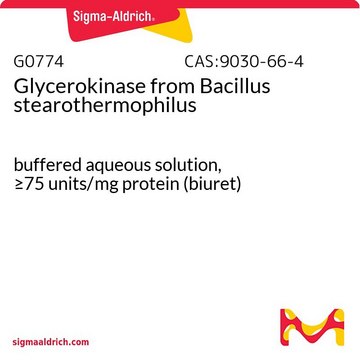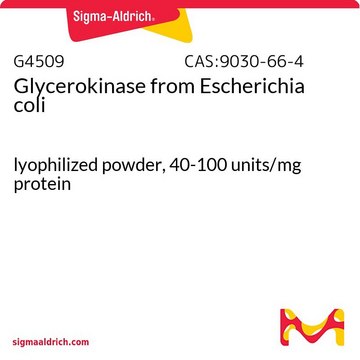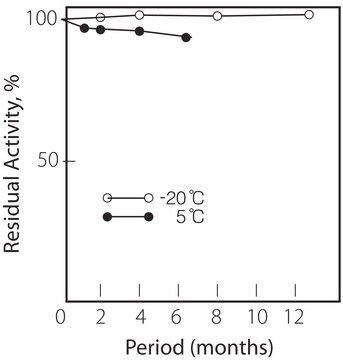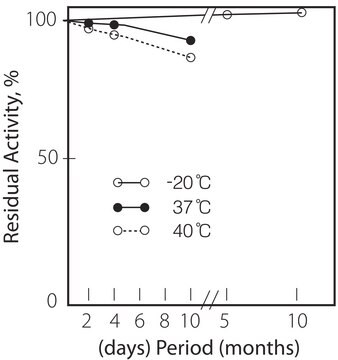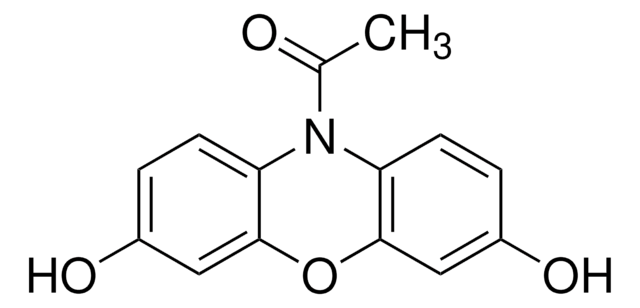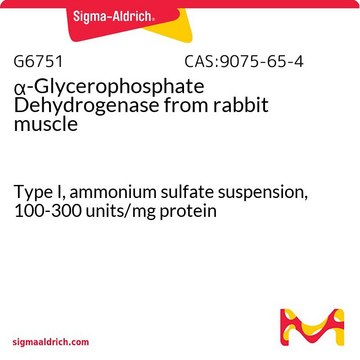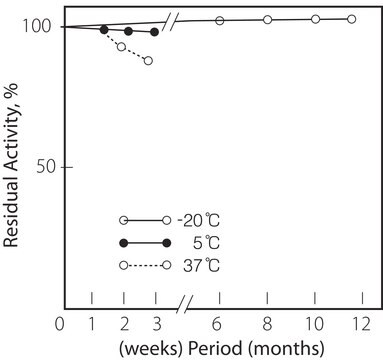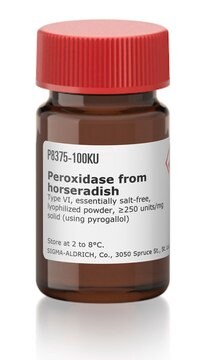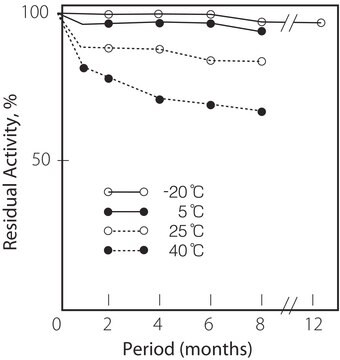G6142
Glycerokinase from Cellulomonas sp.
lyophilized powder, 25-75 units/mg protein
Sinonimo/i:
glpK, ATP:glycerol 3-phosphotransferase, Glycerol Kinase
Autenticatiper visualizzare i prezzi riservati alla tua organizzazione & contrattuali
About This Item
Prodotti consigliati
Stato
lyophilized powder
Livello qualitativo
Attività specifica
25-75 units/mg protein
PM
~128 kDa (by gel filtration)
Composizione
Protein, ≥60% biuret
Temperatura di conservazione
−20°C
Descrizione generale
Research area: Cell Signaling
Glycerol kinase (GK) is part of the FGGY carbohydrate kinase family.
Glycerol kinase (GK) is part of the FGGY carbohydrate kinase family.
Applicazioni
Glycerokinase from Cellulomonas sp. has been used:
- for determining the kinetic characteristics of human and trypanosomatid phosphofructokinases using an enzyme-linked kinetic assay.
- to study the effect of sugar in fluorescence emission.
- in 2-Arachidonoylglycerol-based fluorescence assay for DH-463, a fluorescent activity-based probe for monoacylglycerol lipase.
Azioni biochim/fisiol
Glycerol kinase catalyzes the MgATP-dependent phosphorylation of glycerol to produce sn-glycerol-3-phosphate and is the rate limiting enzyme in the utilization of glycerol. It is also subject to feedback regulation by fructose-1,6-bisphosphate.Mutations in this gene are associated with Glycerol Kinase Deficiency (GKD), a condition characterized primarily by hypertriglyceridemia and hypoglycemia. This enzyme is useful for enzymatic determination of glycerol and triglyceride when coupled with glycerol-3-phosphate dehydrogenase (=G-3-P DH, G3D-301), glycerol-3-phosphate oxidase (=G-3-P oxidase, G3O-301, G3O-311, G3O-321) or pyruvate kinase (PYK-301) and lactate dehydrogenase (LCD-209, LCD-211), lipoprotein lipase (LPL-311, LPL-314) in clinical analysis
Proprietà fisiche
Isoelectric point : 4.2
Michaelis constants : 4.4 x 10-5M (Glycerol), 4.3 x 10-4M (ATP)
Inhibitors : p-Chloromercuribenzoate, heavy metal ions (Pb++, Fe++, Hg++, Ag+)
Optimum pH : 9.8 (G-3-PDH system), 7.8 (G-3-P oxidase system) Optimum temperature : 500C
pH Stability : pH 5.5 x 10.0 (25oC, 20hr)
Thermal stability : below 40oC (pH 7.5, 15min)
Substrate specificity : This enzyme catalyzes the stereospecific transfer of the terminal
phosphoryl moiety of ATP to one of the primary hydroxyl group of
glycerol, forming sn-glycerol-3-P. The enzyme has the highest
specificity for glycerol, and also phosphorylates dihydroxyacetone
and glyceraldehyde (Table 1,2). Mg++ is essentially required for the
reaction.
Michaelis constants : 4.4 x 10-5M (Glycerol), 4.3 x 10-4M (ATP)
Inhibitors : p-Chloromercuribenzoate, heavy metal ions (Pb++, Fe++, Hg++, Ag+)
Optimum pH : 9.8 (G-3-PDH system), 7.8 (G-3-P oxidase system) Optimum temperature : 500C
pH Stability : pH 5.5 x 10.0 (25oC, 20hr)
Thermal stability : below 40oC (pH 7.5, 15min)
Substrate specificity : This enzyme catalyzes the stereospecific transfer of the terminal
phosphoryl moiety of ATP to one of the primary hydroxyl group of
glycerol, forming sn-glycerol-3-P. The enzyme has the highest
specificity for glycerol, and also phosphorylates dihydroxyacetone
and glyceraldehyde (Table 1,2). Mg++ is essentially required for the
reaction.
Definizione di unità
One unit will convert 1.0 μmole of glycerol and ATP to L-α-glycerophosphate and ADP per min at pH 9.8 at 25 °C in a coupled system with PK/LDH.
Stato fisico
Lyophilized powder containing phosphate buffer salts and sodium gluconate
Avvertenze
Danger
Indicazioni di pericolo
Consigli di prudenza
Classi di pericolo
Resp. Sens. 1
Codice della classe di stoccaggio
11 - Combustible Solids
Classe di pericolosità dell'acqua (WGK)
WGK 3
Punto d’infiammabilità (°F)
Not applicable
Punto d’infiammabilità (°C)
Not applicable
Dispositivi di protezione individuale
Eyeshields, Gloves, type N95 (US)
Scegli una delle versioni più recenti:
Possiedi già questo prodotto?
I documenti relativi ai prodotti acquistati recentemente sono disponibili nell’Archivio dei documenti.
I clienti hanno visto anche
Purification and properties of glycerol kinase from Escherichia coli.
S I Hayashi et al.
The Journal of biological chemistry, 242(5), 1030-1035 (1967-03-10)
Zhongya Qin et al.
Biomedical optics express, 9(7), 3373-3390 (2018-07-10)
The femtosecond laser ablation in biological tissue produces highly fluorescent compounds that are of great significance for intrinsically labelling ablated tissue in vivo and achieving imaging-guided laser microsurgery. In this study, we analyzed the molecular structures of femtosecond laser-ablated tissues
N Zwaig et al.
Journal of bacteriology, 102(3), 753-759 (1970-06-01)
The activity of glycerol kinase is rate-limiting in the metabolism of glycerol by cells of Escherichia coli. A mutant strain producing a glycerol kinase resistant to inhibition by fructose-1,6-diphosphate grows faster than its wild-type parent on glycerol as the sole
Ioanna Gouni-Berthold et al.
The British journal of nutrition, 107(11), 1694-1706 (2011-10-15)
Animal and human studies suggest that a malleable protein matrix (MPM) from whey decreases plasma lipid concentrations and may positively influence other components of the metabolic syndrome such as glucose metabolism and blood pressure (BP). The primary objective of this
Daria V Cherkashina et al.
Rejuvenation research, 14(6), 661-667 (2011-10-20)
Abstract Effects of stem and progenitor cells or their compounds on recipient cells are investigated intensively today. In spite of this, their ability to interact with native cells and the final targets affected by them, particularly biochemical parameters that characterize
Il team dei nostri ricercatori vanta grande esperienza in tutte le aree della ricerca quali Life Science, scienza dei materiali, sintesi chimica, cromatografia, discipline analitiche, ecc..
Contatta l'Assistenza Tecnica.